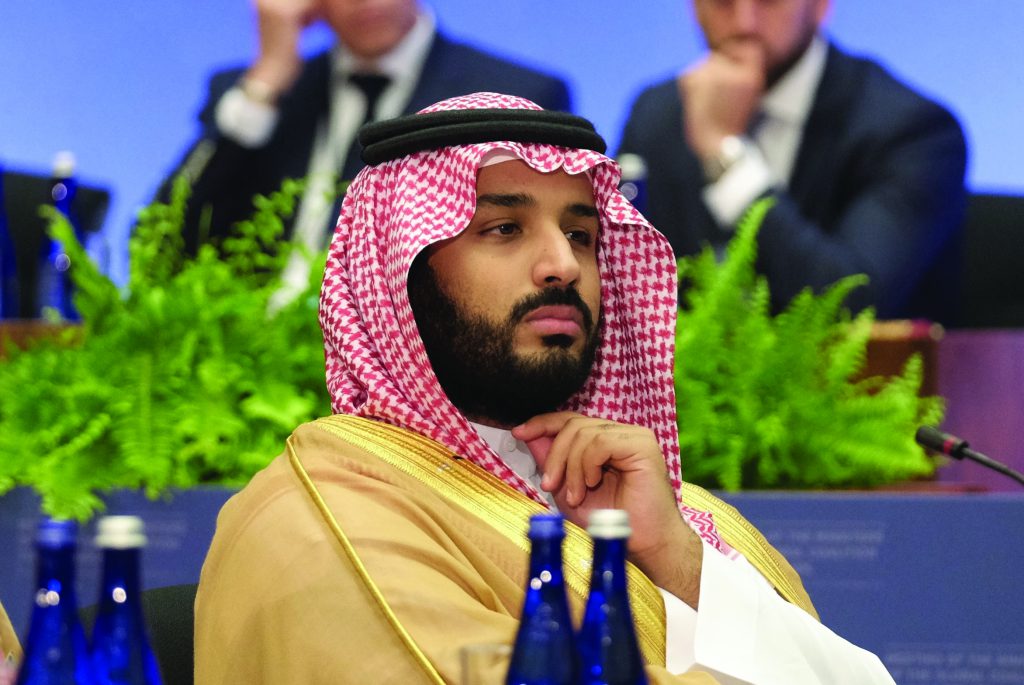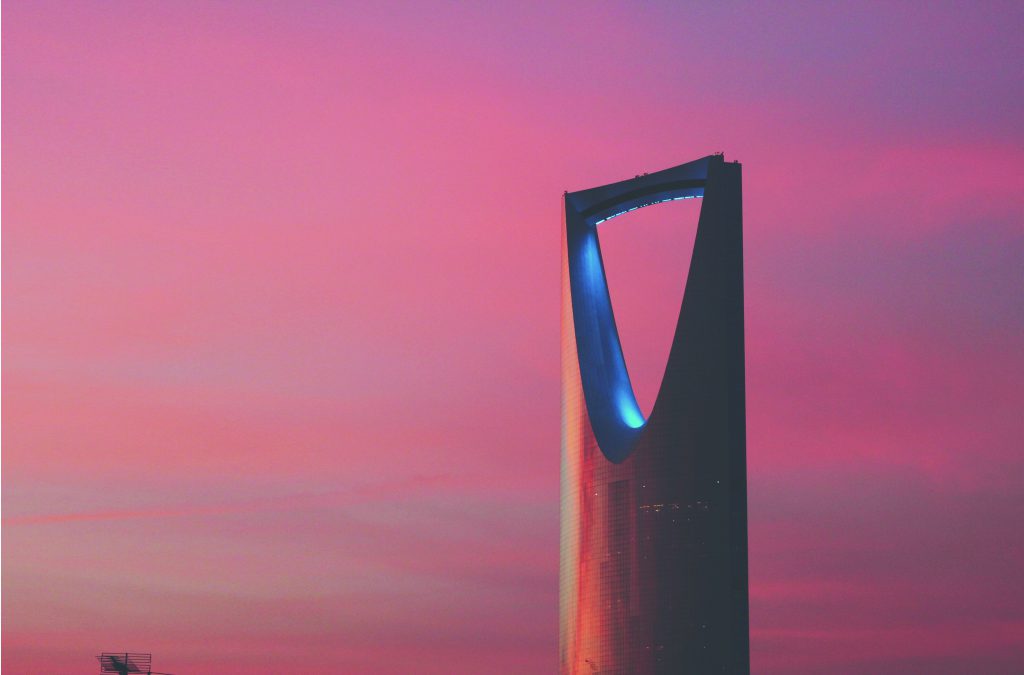In the last years of King Abdullah, the ruler of Saudi Arabia, the royal family’s anxiety grew increasingly real. Since 1953, the tradition in Saudi Arabia, was to pass the Royal Scepter between the sons of the founder of the kingdom, Ibn Saud, and not from father to son, as part of the internal politics determined by the many wives and children of Ibn Saud. When Abdullah died at age 90, the candidates for his replacement were no longer young men. However, the transfer of the role to the next generation raised fears of an internal civil war breaking out between the thousands of princes, a war that might have threatened the very existence of the house of Saud.
Ultimately, the successor to the late king was his half-brother Salman, who enjoyed the confidence of all the other brothers and would even moderate between them in various conflicts. But Salman himself understood that at age 80, with failing health, he was just a stopgap, postponing the matter some number of years. Salman had thirteen children, of which nine were boys. Muhammad was the sixth brother, evidently also the favorite, and the most talented among them. Salman appointed him first deputy heir, a role invented a few months prior when the role of crown prince was given to the king’s brother, the prince Muqrin.

For the next two years, Salman and his son Muhammad dedicated a significant portion of their time to preparing the latter for the role of heir to the throne. Opponents were eliminated, and Muhammad was granted much authority (including the role of Defense Minister, becoming “commander” of the war in Yemen). In the end Muhammad, in fact the most powerful man in Saudi Arabia, was appointed heir to the throne.
In August, Muhammad will be 33. If nobody sabotages his plans, the prince is supposed to rule Saudi Arabia in the next decades and ultimately pass the role down to one of his sons. If we wish to understand where Saudi Arabia is headed in the near future, we must understand how this man operates.
When King Salman rose to power in January 2015, there were three major threats to the future of the kingdom, each of which might have brought an Arab Spring to the Arabian Peninsula and a government overthrow: the Iranian threat, a drop in oil prices, and Sunni Jihadist terror. Saudi Arabia’s capacity to deal with these threats was limited. The royal family, run by the elderly, had difficulty making decisions and carrying out deep reforms. Moreover, the Obama government made several moves that dramatically affected Saudi Arabia. Above all, his decision to minimize the American presence in the Middle East in general, and in the Persian Gulf in particular, as well as ratifying the Iran nuclear agreement, allowed Iran to become even stronger and left Saudi Arabia exposed to various security threats. Obama’s policy (supporting the Morsi regime in Egypt, electing to not assist the leaders of Tunisia and Yemen), also made it easier for Sunni Jihadist terror to rise up in the region.
A few years earlier, as the crown prince and Saudi Minister of Defense, Salman worked to fortify Saudi Arabia, bringing the Saudi defense budget to a sum of 67 billion dollars, larger even than that of Britain. In his first decisions as king, he presented far-reaching reforms in reducing government bureaucracy, but most of all, his priority was to strengthen the status of his son, Muhammad.
In November 2017, there was a widespread wave of arrests of about 500 of Saudi Arabia’s top financiers and princes, (see page …). The official reason – accusations of corruption. As part of the arrests, some of their assets were also frozen, to the tune of hundreds of billions of dollars, which led to the assessment that the purpose of the purge was to fill the Saudi treasury, which has been emptying steadily since 2014 due to the drop in oil prices. Salman’s son, by the way, is no small squanderer – in 2015 he acquired an enormous yacht, 134 meters long, for half a billion euros. He also bought a huge castle in France for 300 million dollars and there are rumors that he spends hundreds of millions on art.
But despite the financial matter, it seems that the heir to the Saudi throne worked toward strengthening his position, as he distanced from power those who he thought were strong enough to threaten him or who he perceived to be unfaithful. As a complementary measure, 26 new judges were appointed, all faithful to the crown prince. The new Saudi Arabia is being shaped by the character of the future king.
Train to Riyadh
Meanwhile, a new president has entered the White House, and the American policy in the Middle East has undergone a very positive turn for the Saudis.
Unlike Obama, Trump sees US interest in the Middle East through special binoculars – one Israeli lens and the other Saudi, and for a number of issues, such as the Iranian threat or the Jihadi threat, they produce the same picture.
The Kingdom of Saudi Arabia is hungry for investments and Western technology, and a return to warm relations between the US and Saudi Arabia, as there were before the Arab Spring. This is a central element in the Saudi plan to reshape the kingdom’s economy – starting with a withdrawal from the almost complete dependence on oil, by encouraging foreign investments through to diversification and utilization of manpower in the kingdom.
In this context, it is also possible to understand the far-reaching reforms in Saudi terms regarding the civil rights of women in the kingdom (permission to get a driver’s license, to watch a soccer match at the stadium or plans to bring women into the labor market, for example) as well as other reforms such as opening cinemas and attempting to attract Western tourists to the country. The country has also abolished many subsidies and privileges to citizens of the kingdom and the thousands of princes, saving the state billions of dollars.
However, besides the social and cultural reforms, the crown prince’s primary object is to attract foreign money and knowhow in order to develop new economic areas in Saudi Arabia.
An important step to this end was Muhammad’s recent journey to the USA. Over the course of two and a half weeks, he met with a series of senior American officials, including the president Trump, with whom he signed a large arms deal worth $ 12.5 billion. The heir to the throne also managed to meet with central figures from the high tech scene and even Hollywood stars (see box).
In an old joke there was a Saudi prince studying in the US, embarrassed because he turned up to school in a new Lamborghini, while his peers took the train. His father, hearing the problem, understood immediately and offered him several billion dollars to get himself a train…
This crown prince was indeed interested in acquiring a train during his visit to the US, or, more precisely the HyperLoop, a project which is the vision of Elon Musk, that various companies are invested in. If it takes shape according to plan, the HyperLoop will be able to carry passengers and goods at a supersonic speed of up to 1,220 km/h, faster than passenger and transport aircraft that operate today, and so to alter the face of public transportation the world over. Currently, the trip between the capital city of Riyadh to the city Jeddah, the nation’s largest cities in which live a third of the Saudi population, takes ten hours. A direct flight can reduce the distance to 95 minutes. The HyperLoop might reduce the travel time to just 76 minutes.
Surprising Statements
From the Israeli perspective, the rise of Salman’s son is a positive development. Similar interests between Israel and Saudi Arabia regarding the growing power of Iran led the Saudi prince to conduct policy which is considered relatively “pro-Israeli”. The warming relationship is reflected in the era of Muhammad not only in the various behind-the-scenes orchestrations, such as the permission given to the Indian airline Air India to fly from Israel to India through Saudi airspace, but rather, also in far-reaching public declarations. He has long said that Israelis have the right to a state of their own. Recently, Bahrain’s foreign minister followed suit, saying, in response to Iran’s failed attack on the northern border which was answered with Israel’s severe response, that Israel has a right to defend itself. This would have been unbelievable a few years ago. For the tiny Bahrain, with a Shiite majority, to support Israel against Iran, seems like suicide. They would not do so had they not thought they would be fully backed by the Saudis and the Americans.
These were not the only surprising statements. In a conversation with Jewish leaders in the US last month, the crown prince expressed harsh criticism of the Palestinian Authority and its leader Abu Mazen, holding them responsible for missing out on a long list of opportunities for peace over the years.
Saudi Arabia First
The sharp change in Saudi Arabia’s policy positions is not only related to the Iranian threat. Over the years, the kingdom supported radical Sunni movements and funded Sunni jihadi terror, but last year the son of Salman declared that this era was over. Those same organizations which in the past had served the Saudi interests became threats, and Saudi Arabia began to work to limit their operations.
In Egypt, the Saudis are keeping al-Sisi’s regime alive by supplying them with billions of dollars and weapons of similar value each year. Egypt is at the forefront of some of the struggles against Sunni terrorism – the fight against ISIS in the Sinai peninsula and the struggle against the Muslim Brotherhood. Egypt, as the largest of the Arab states and the source of a considerable portion of the various ideologies of Sunni terror organizations, is an important target for the Saudis and the regime of al-Sisi is of great significance.
Regarding Syria, there is disagreement between Saudi Arabia and Egypt. The Egyptians tend to prefer the continued rule of the secular Assad, while the Saudis see Assad as an Iranian puppet and are thus opposed. But regarding the struggle against the Sunni Jihadists, Egypt and Saudi Arabia are partners. It is no wonder that the al-Sisi regime, on account of shared interests, is now considered to be the friendliest in the history of Israel-Egypt relations, and these relations generally allow an effect struggle against Hamas in Gaza.
Qatar is another front. Saudi Arabia has managed to turn the small emirate into a pariah state in the Arab region. Qatar has long been seen as one of the main supporters of Sunni terrorism (see page …) and also as a danger to Arab stability through inciting violence on the Al Jazeera network that it owns. The Saudis mobilized all their allies throughout the Middle East to isolate the Qataris, who found themselves with support from just Iran and Turkey, with the Americans occasionally trying to resolve the conflict.
On the day when the son of Salman officially takes over, the pace of the reforms in the kingdom will accelerate, and regarding Israel, might open up new opportunities. The days in which oil ran like water and the American army was ready to remove any threat from the kingdom have passed, and with it the Saudi complacence, which led to their involvement in a series of issues that did not directly concern them. These days, the Saudis are focused on the kingdom’s immediate needs. This opened the door to a deepening of the relations between Israel and Saudi Arabia, in a long list of projects and transactions, in which Israel brings its own knowledge and experience in place of the concessions that were required in the past in exchange for normalization with the Arab and Muslim world. It will not happen tomorrow morning, but it seems that that is the direction in which we are headed.





